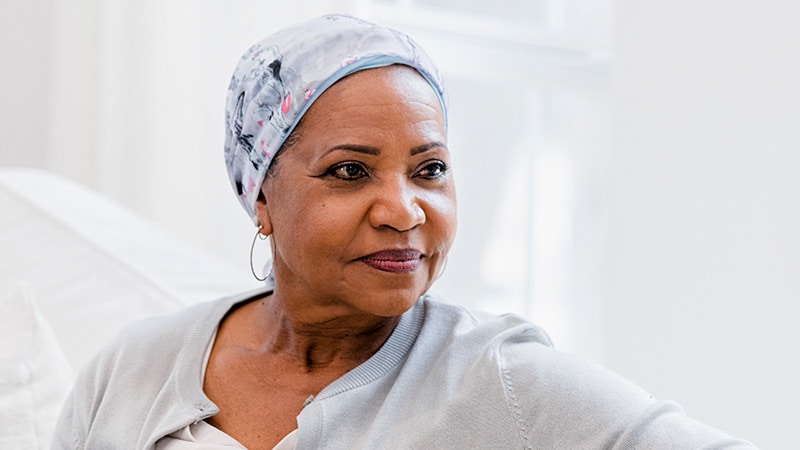Validation of Breast Recurrence Score in Different Ethnic Groups
Core Concepts
The Oncotype 21-gene breast recurrence score is a validated predictive biomarker for chemotherapy benefit in ER-positive/HER2-negative breast cancer across various ethnic groups.
Abstract
The study validates the Oncotype 21-gene breast recurrence score as a predictive biomarker for chemotherapy benefit in women with ER-positive/HER2-negative breast cancer across different ethnic groups.
TOPLINE:
- Study validates Oncotype 21-gene breast recurrence score.
- Predictive biomarker for adjuvant chemotherapy benefit.
- Focus on women with ER-positive/HER2-negative breast cancer.
METHODOLOGY:
- Oncotype 21-gene score used for treatment decisions.
- Aimed to verify accuracy in underrepresented racial/ethnic groups.
- Analyzed data from women with stages I-II breast cancer.
- Evaluated impact on breast cancer death rates.
TAKEAWAY:
- Chemotherapy use varied among different ethnic groups.
- Risk for breast cancer deaths reduced with chemotherapy.
- No improvement in breast cancer mortality in Asian/Pacific Islander women.
- Lower potential cutoff for recommending chemotherapy in certain groups.
IN PRACTICE:
- Study clinically validated recurrence score as a predictive biomarker.
- Prospective trials recommended to confirm findings.
SOURCE:
- Led by Hsiao-Ching Huang, MPH, PhD.
- Published in the Journal of the National Comprehensive Cancer Network.
LIMITATIONS:
- Retrospective design with potential confounding variables.
- Lack of data on adjuvant endocrine therapy use.
- Incomplete information on chemotherapy in the SEER registry.
- Unknown HER2 status for patients before 2010.
DISCLOSURES:
- Supported by AbbVie Fellowship and National Cancer Institute.
- Some authors received financial support outside this work.
Customize Summary
Rewrite with AI
Generate Citations
Translate Source
To Another Language
Generate MindMap
from source content
Visit Source
www.medscape.com
Study Validates Breast Recurrence Score Across Ethnic Groups
Stats
"Of the 73,363 women included, 8.2% were Asian/Pacific Islander, 7.8% were non-Hispanic Black, 9.1% were Hispanic, and 74.9% were non-Hispanic White."
"Use of chemotherapy was significantly higher in non-Hispanic Black women (22.45%) than in Asian/Pacific Islander (20.87%), Hispanic (20.31%), and non-Hispanic White (19.13%) women (P < .0001)."
"The risk for breast cancer deaths was significantly reduced with chemotherapy in non-Hispanic Black (hazard ratio [HR], 0.70), Hispanic (HR, 0.38), and non-Hispanic White women (HR, 0.75)."
"Chemotherapy use did not improve breast cancer mortality in Asian/Pacific Islander women overall (HR, 0.67; 95% CI, 0.42-1.07)."
Quotes
"this study clinically validated [recurrence score] as a predictive biomarker in non-Hispanic Black, Hispanic, and non-Hispanic White women"
Key Insights Distilled From
by Deepa Varma at www.medscape.com 01-25-2024
https://www.medscape.com/viewarticle/study-validates-breast-recurrence-score-across-ethnic-groups-2024a10001u0
Deeper Inquiries
What are the implications of the study findings on personalized treatment approaches for breast cancer patients
The study findings have significant implications for personalized treatment approaches for breast cancer patients, particularly those belonging to different ethnic groups. By validating the Oncotype 21-gene breast recurrence score as a predictive biomarker of adjuvant chemotherapy benefit across racial and ethnic minorities, clinicians can now make more informed decisions regarding treatment strategies. This validation allows for a more tailored and personalized approach to treatment, ensuring that patients receive the most effective interventions based on their individual risk profiles. The study's results underscore the importance of considering race and ethnicity in treatment decisions, highlighting the need for personalized care that takes into account the unique characteristics of each patient.
How might socioeconomic factors influence the disparities in chemotherapy use among different ethnic groups
Socioeconomic factors can play a significant role in influencing the disparities in chemotherapy use among different ethnic groups. Factors such as access to healthcare, insurance coverage, financial resources, and cultural beliefs can all impact a patient's decision to undergo chemotherapy. For example, disparities in healthcare access and quality may result in certain ethnic groups facing barriers to receiving recommended treatments. Additionally, financial constraints can limit the ability of some patients to afford chemotherapy, leading to disparities in treatment utilization. Cultural beliefs and attitudes towards healthcare may also influence treatment decisions, with some ethnic groups being more or less likely to accept chemotherapy based on cultural norms. Addressing these socioeconomic factors is crucial in reducing disparities in chemotherapy use and ensuring equitable access to care for all breast cancer patients.
How can the study's recommendations for lower recurrence score cutoffs in certain groups impact current clinical practices
The study's recommendations for lower recurrence score cutoffs in certain groups can have a significant impact on current clinical practices related to breast cancer treatment. By suggesting that non-Hispanic Black women aged 50 years and younger may benefit from lower recurrence score cutoffs for recommending chemotherapy, the study highlights the importance of considering race and age-specific factors in treatment decisions. Implementing these recommendations could lead to more targeted and effective treatment strategies for this specific population, potentially improving outcomes and reducing disparities in care. Clinicians may need to adjust their approach to treatment recommendations based on these findings, incorporating race and age-specific considerations into their decision-making processes. Further research and prospective trials are needed to validate these recommendations and guide clinical practice in the future.
0
